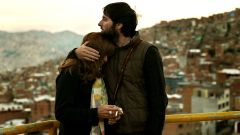54th THESSALONIKI INTERNATIONAL FILM FESTIVAL
November 1 - 10, 2013
PRESS RELEASE
CONTEMPORARY ARGENTINE CINEMA
The cinema of Argentina, one of the most fascinating and developed cinemas of Latin America, boasts a long and productive history, a socially conscious, politically minded, engaging character and a constantly evolving nature. More recently, the crippling recession at the beginning of the 21st century gave birth to novel and significant cinematic motivation, which in fact continued in the footsteps of the art-house wave that began in the 1990s with directors such as Lisandro Alonso, Lucrecia Martel, Martin Rejtman, and Pablo Trapero. Today, more than a decade later, the newest generation of Argentine filmmakers emerges.
Much like their predecessors, today’s Argentine directors are interested in novel forms and ideas and in challenging aesthetic and narrative norms. They also look closely at the human behaviors, emotions and thought processes at the heart of their stories. During the 54th Thessaloniki International Film Festival, a diverse selection of 7 films showcases the newest works and filmmakers coming out of Argentina. These films assess contemporary society by peering into its smaller units: relationships between friends and couples as well as family members; generational and class struggles; romantic predicaments and the uncertainties of youth fuel their intriguing cinematic explorations.
THE FILMS:
Deshora by Barbara Sarasola-Day, 2013, 102’, Argentina/Colombia/Norway
 Sarasola-Day’s skilled and moody feature debut (the untranslatable word “deshora” conveying the idea of a limbo, a state of waiting) was shot in an imposing mountainous area of north western Argentina and observes how the arrival of a young male cousin destroys the fragile balance between childless husband and wife Ernesto and Helena. New intimacies are born and repressed desires emerge in the relationships between the three, while the provincial, isolated environment in which the story takes place serves as an ideal backdrop.
Sarasola-Day’s skilled and moody feature debut (the untranslatable word “deshora” conveying the idea of a limbo, a state of waiting) was shot in an imposing mountainous area of north western Argentina and observes how the arrival of a young male cousin destroys the fragile balance between childless husband and wife Ernesto and Helena. New intimacies are born and repressed desires emerge in the relationships between the three, while the provincial, isolated environment in which the story takes place serves as an ideal backdrop.Hawaii by Marco Berger, 2013, 102’, Argentina
Director Marco Berger, focusing on a male gay milieu (his previous film, Absent, won the Teddy Award in the 2011 Berlin IFF) explores, in his third and most mature film, the romance between two young men from different social backgrounds. The relationship between Eugenio, a writer, and penniless Martin, begins and develops in a carefree summer bubble, but it will soon confront the realities of the outside world. Nuanced performances by the two protagonists and Berger’s subtle approach to romance and class differences make for a delicate and perceptive film.
La Paz by Santiago Loza, 2013, 73’, Argentina

Liso, a young man who has been released from a psychiatric hospital, returns to his parents’ home. Struggling to overcome his mental health problems, Liso is asphyxiating inside the confines of his middle-class surroundings, as well as his mother’s love. Like Hawaii, La Paz is also concerned with class differences, mainly portrayed through Liso’s relationship with the family’s maid. What makes for a robust and compelling dramatic piece, however, is the film’s affection for and deep interest in the journey of its central character and his search for peace.
Leones by Jazmin Lopez, 2013, 80’, Argentina/France/Netherlands
Jasmin Lopez’s film, fluidly and expertly shot by DP Matias Mesa (the steadicam operator for Gus Van Sant’s Gerry and Elephant), constructs a unique cinematic experience. Five teenagers wander in a forest –they are fascinated with word games, but do not really care about constructing meaning or reaching a destination. To them, time seems to be a concept without significance or relevance. The film stretches both the narrative and formal boundaries of cinema, making for an impressive feature debut.
Noche by Leonardo Brzezicki, 2013, 85’, Argentina
Another first feature permeated with a spirit of cinematic experimentation, Noche, is remarkably atmospheric. The friends of sound recordist and designer Miguel, who committed suicide, gather in his farmhouse to grieve for his death; loudspeakers are everywhere around them, broadcasting samples that have been recorded by him (the film’s production designer is Alexis Dos Santos, director of Unmade Beds). The film’s intricate soundscape, completely surrounding the human element, creates a striking contrast between life and death, and between the viewers’ visual and auditory experience.

The Owners (Los duenos) by Agustin Toscano and Ezequiel Radusky, 2013, 95’, Argentina
While the owners of a provincial estate in northern Argentina are absent, its three caretakers take over the house, sleeping in their employers’ beds, swimming in their pool and pretending to be what they are not. When the owner’s daughters arrive in the estate the pretense ceases; the relationships between the upper class and the workers are thrown into sharp relief. The darkly comic feature, shot in the directors’ native region of Tucuman and the first film to be shot there in three decades, is Toscano’s and Radusky’s cinematic debut (they are very active theater actors and playwrights).
Viola by Matias Pineiro, 2012, 65’, Argentina
Viola, partly based on and inspired by a scene from Shakespeare’s Twelfth Night, centers on a group of young women, most of them actresses, rehearsing and talking, delving into matters of love and companionship, both on a practical and philosophical level. Pineiro’s film –and his work in general- centers on the lives of intelligent young women in the bohemian/artistic circles of Buenos Aires. The plots themselves are assemblages of small, everyday moments, rendered playful and meaningful through witty dialogue and wonderful performances.















